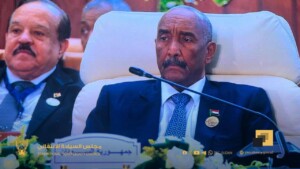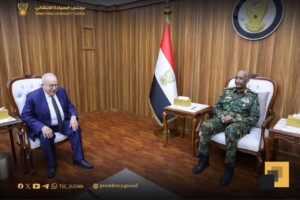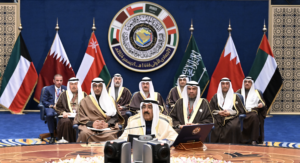Quotas to address Sudan’s civil service imbalances
Sudan’s transitional government and the armed struggle movements of the Darfur track that are currently engaged in peace talks in the South Sudanese capital of Juba have agreed on specific criteria to address civil service imbalances in Sudan and the formation of a joint committee to address civil service issues.
 North Darfur state government building in El Fasher (File photo)
North Darfur state government building in El Fasher (File photo)
Sudan’s transitional government and the armed struggle movements of the Darfur track that are currently engaged in peace talks in the South Sudanese capital of Juba have agreed on specific criteria to address civil service imbalances in Sudan and the formation of a joint committee to address civil service issues.
According to Ahmed Tugod, the chief negotiator of the Justice and Equality Movement (JEM), these standards are based on the criteria of population density and positive discrimination.
In this regard, Tugod called for the necessity of agreeing on specific percentages in which people are absorbed in the sovereign, upper, middle, and entry positions in the civil service.
He also called for the necessity of agreeing on a specific quotas based on the percentage of population density for each province in which people are chosen through specialised committees that are from the concerned provinces, to include all components of the province.
Sudan Liberation Movement (SLM-AW)
Abdelwahid El Nur, faction leader of the Sudan Liberation Movement (SLM-AW), called on the members of his movement to “stand with the prime minister and liberate him from quotas and the Forces for Freedom and Change”.
In a speech via telephone to the graduation of students of the United Popular Front at El Zaeem El Azhari University, El Nur said: “The prime minister is surrounded by people without a vision of running the country,” and warned of “the collapse of the state”.
He said that the movement is in the process of launching an initiative for a national dialogue to study Sudan’s problems, determine the causes of wars and economic crises, and define resource management and diversity.
He called for “a real new transition” that would end what he described as “the current failure”.
He pointed to the movement’s readiness to negotiate with the government on its initiative, pointing to seven rounds of negotiations with the former regime for the same goal.
Sudan Liberation Movement (SLM-MM)
Yesterday, the Sudan Liberation Movement led by Minni Minawi (SLM-MM) and the Sudanese alliance led by Khamis Abdallah Abakar signed in Juba for cooperation and unification of visions on Sudanese issues.
He said that the two sides agreed to unify visions on the Sudanese issues and adopt the principles of citizenship and equality in participation and distribution of opportunities and a fair division of power and wealth.
He expressed their readiness for complete unity.
Minawi affirmed the movement’s support for the Sudanese alliance joining the Darfur track towards a lasting and comprehensive peace.
He noted the Sudanese Revolutionary Front’s keenness that Juba be a last stop for peace and that it should include everyone, calling for opening the platform to introduce everyone, especially in the track of Darfur.
Radio Dabanga’s editorial independence means that we can continue to provide factual updates about political developments to Sudanese and international actors, educate people about how to avoid outbreaks of infectious diseases, and provide a window to the world for those in all corners of Sudan. Support Radio Dabanga for as little as €2.50, the equivalent of a cup of coffee.












 and then
and then